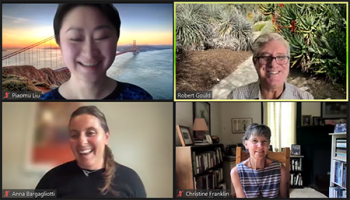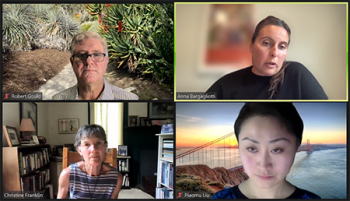

What are the challenges and changes that have happened to teaching stats and data science in grades K-12 over the years? What has worked? How do we best equip our students with the data skills they need, after all, the kids in school today are the future! The goal of this session was to facilitate a conversation around the most relevant and urgent questions that are facing statistics and data science education in grades K-12 today.
NISS brought together three participants for this session who have extensive experience in statistics education, Anna Bargagliotti, (Loyola Marymount University), Christine Franklin (ASA and University of Georgia), and Rob Gould (UCLA). All three are members of the writing team of the GAISE Pre-K – 12 Guidelines for Assessment and Instruction in Statistics Education II Report, Bargagliotti and Franklin serving as co-chairs of this committee. (see Event page)
This session was presented in a structured debate type format. The participants were given selected questions ahead of time so they had a chance to think about their responses and the moderator, Piaomu Liu (Bentley University) used a consistent, rolling format that provided each participant with equal opportunity to be the first to respond to a question as well as respond or follow-up based on the remarks of the other participants.
Here are a few of the questions that the speakers were asked to respond to:
How to define statistics education and data science education in grades K-12? Statistics or data science?
Is statistics and data science education too ambitious a goal to pursue in grades K-12, for both the students and teachers?
Has K-12 statistics and data science education been successful so far? By what measures?
Can data sense, or data acumen, be trained well at K-12 or even younger? Are there any unique challenges and benefits of developing data acumen in K-12?
Small datasets or big data for teaching and practice at this level?
To keep up with the demand for data analysis and problem-solving skills from a fast-changing data-driven world, are core statistical and mathematical concepts changing?
Truth be told, there was not not as much disagreement as in previous debates, however, the responses and comments from the three participants clearly described the variety of important factors related to moving forward. It became clear that these issues are not simple, isolated challenges but instead are complex and interconnected. Foundationally, the importance in today’s world was made clear.
“We live at a time where software is inexpensive to free and data is plentiful so there's really no reason not to teach people to analyze data and understand. … it's an opportunity to prepare future citizens to be constructively critical, not just blankly skeptical of data oriented arguments to participate in a democracy.”
Rob Gould (UCLA)
However, cautions were tendered about how we move forward, including:
“Pitting calculus against statistics or data science, that is inadvertently going to squeeze out students from majors where we already have pipeline problems, particularly with underrepresented groups. And so I think we have to be very careful, especially at the high school, level how we understand and guide and advise students.”
Anna Bargagliotti, (Loyola Marymount University)
As well as suggestions for how to think about working together:
“I think this is sort of a culture issue within our schools and our districts and even within our state where this has to be made a priority. It's not just individual teachers that are going to be taking the professional development, but it's schools, working together as a team, districts working together, and I think once you set that as a priority, then the teachers see it as a team effort.”
Christine Franklin (University of Georgia)
The 120+ attendees were very active in the session as well posting over thirty questions, many questions were addressed but still many left unanswered. Attendees also provided comments and links to resources as well!
To get a full sense of the issues, challenges and strategies for moving forward, you must review the recording of this session. NISS hopes to continue to play a role to help keep this conversation alive as steps are taken and progress is made.
Please feel free to view the recording of this session below. In addition, the speakers put together an extensive list of resources related to this topic which are shared below.
Recording of the Session
NISS K-12 Webinar Resource List
Anna Bargagliotti, Christine Franklin, and Rob Gould
Download this list as a pdf document
Important Reports
Pre-K-12 Guidelines for Assessment and Instruction in Statistics Education II (GAISE II) https://www.amstat.org/asa/education/Guidelines-for-Assessment-and-Instr... Statistics-Education-Reports.aspx
The Statistical Education of Teachers (SET): https://www.amstat.org/asa/files/pdfs/EDU-SET.pdf
The NCTM Catalyzing Change Reports: https://www.nctm.org/Standards-and- Positions/Catalyzing-Change-Additional-Resources/
Very Recent Articles Describing Examples of Data Science at the School Level
Harvard Data Science Review (HDSR) Journal– Two articles introducing GAISE II and Level A. Articles on Level B and Level C to appear later in 2021 https://hdsr.mitpress.mit.edu/pub/cqncbp3l/release/3 https://hdsr.mitpress.mit.edu/pub/wqoysrrt/release/2?readingCollection=3...
Ask Good Questions Blog – “Lizards and Ladybugs” https://askgoodquestions.blog/2020/08/10/58-lizards-and-ladybugs-illustr... questioning/
Significance Journal - “As Covid makes clear, statistics education is a must”
https://rss.onlinelibrary.wiley.com/doi/full/10.1111/1740-9713.01509
Association for Women in Mathematics (AWM)
https://awm-math.org/wp-content/uploads/2020/10/AWM-News-NovDec-2020-PRI...
Journal of Statistics and Data Science Education (JSDSE) – “What is a Good Statistical Question” https://www.tandfonline.com/doi/full/10.1080/26939169.2021.1877582
General Resources
Visit the wealth of K-12 teacher resources at the ASA education link: https://www.amstat.org/asa/education/K-12-Educators.aspx
Census at School: https://ww2.amstat.org/censusatschool/
The Statistics Teacher: https://www.statisticsteacher.org/
STEW Lesson Plans: https://www.amstat.org/asa/education/stew/home.aspx
This is Statistics – explore careers in Statistics: https://thisisstatistics.org
Software
CODAP – open source: https://codap.concord.org/
Art of Stat – open source applets: https://artofstat.com
Curriculum
The Mobilize Introduction to Data Science (IDS) Course (open source) https://www.introdatascience.org/
Assessment
Levels of Conceptual Understanding in Statistics (LOCUS) – NSF Grant – Pre-K-12 Assessment https://locus.statisticseducation.org
Great Blogs
Skew the Script: https://skewthescript.org/
Ask Good Questions: https://askgoodquestions.blog/
High Quality Free Professional Development
Amplifying Statistics and Data Science in Classrooms: http://go.ncsu.edu/amplifystats
InSTEP: http://instepwithdata.org
To be published in 2021 by Joint ASA-NCTM committee:
Book: Statistics and Data Science for Teachers – book will be open source
check here for updates: https://www.amstat.org/AMSTAT/Education/K-12- Educators/ASA/Education/K-12-Educators.aspx?hkey=66767c1e-fea8-43ea-8665-12bf718997f6
Other Resources
Teacher Meet Ups K-12 Chats
ASA: https://www.youtube.com/channel/UCESYnsheh2TclJlZW13sdBQ
The Messy Data Coalition https://messydata.org/
International Statistical Review – “Statistics and the Modern Student”
https://onlinelibrary.wiley.com/doi/abs/10.1111/j.1751-5823.2010.00117.x
Special Edition of Teaching Statistics: "Teaching Data Science and Statistics: senior school or introductory tertiary" An international collection of invited and submitted articles on research and practice.
Journal of Statistics and Data Science Education, Volume 29, Issue sup1 (2021): Computing in the Statistics and Data Science Curriculum
"Ensuring that mathematics is relevant in a world of data science" -https://www.ams.org/publications/journals/notices/201709/rnoti-p986.pdf
About the Participants
Dr. Anna Bargagliotti is Professor of Mathematics, in the Seaver College of Science and Engineering at Loyola Marymount University. She received her Ph.D at the University of California, Irvine in Mathematics and her MS at the University of California, Los Angeles in Statistics. She is the current chair of the NCTM/ASA joint committee, a lead author on the new jointly published ASA/NCTM GAISE II report, and an author on the ASA SET report. Dr. Bargagliotti’s interests are in nonparametric statistics, statistics education throughout the K-16 grade bands, data visualization, and multivariate models. She has received over 4 million dollars in funding to carry out her research and published over 50 research articles, columns, reports, OpEds, and book chapters. She is also the recipient of the ASA’s Waller award, Mu Sigma Rho’s Warde award, the Dex Whittinghill award, and the Elizabeth and Michael Rudinica Prize.
Dr. Christine Franklin is Senior Lecturer Emeritus in the Department of Statistics at the University of Georgia and currently serves as the ASA K-12 Ambassador. She has an extensive list of achievements notably recipient of the Georgia Council of Teachers of Mathematics Gladys Thompson Lifetime Achievement Award in 2017, American Statistical Association Founder's Award in 2014, and the USCOTS Lifetime Achievement Award in 2013. She also served as Chair of the American Statistical Association sponsored strategic initiative, “SET – The Statistical Education of Teachers”, and served as Chief Reader for the AP Statistics exam.
Dr. Robert Gould is currently the vice chair of the Department of Statistics and Director of the Center for Teaching Statistics at UCLA. He received his Ph.D at the University of California, San Diego in Mathematics. He is a Fellow of the American Statistical Association, and has been chair of the AMATYC/ASA joint committee and the NCTM/ASA joint committee. He is founder of the ASA DataFest and co-chairs the DataFest Planning Committee. Dr. Gould’s research interests is in statistics education, and he was lead principal investigator in the Mobilize project, which created the Intro to Data Science curriculum -- the first secondary level data science course in the country. He coauthored the Introductory Statistics: Exploring the World With Data Analysis textbook with Colleen Ryan and Rebecca Wong and he is a founding editor of the e-journal, Technology Innovation in Statistics Education.
